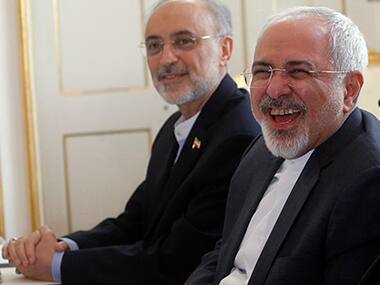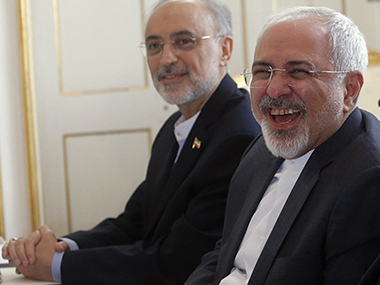Tuesday’s deal between the permanent members of the Security Council and the European Union has cleared a historic hurdle in nuclear-age diplomacy. The decision requires reduction in uranium enrichment from Iran and in return lifts economic sanctions on Iran’s oil exports. In the shadow of the global celebration of the accord’s symbolic importance is a quickly forming prospect of economic opportunism from major powers. According to CNN Money, the price of Oil plummeted to $51 dollars a barrel on Tuesday before the deal was finalised. [caption id=“attachment_2346142” align=“alignleft” width=“380” class=" “]  Iranian Foreign Minister Javad Zarif laughs during during meetings between Iran and the UN Security Council member states. AP[/caption] Russia has met its match with Iran The Moscow Times reported that, while President Vladimir Putin celebrated in public media, stating “the world can now breath a sigh of relief"and cited this decision as an integral step to combating terrorism in the Middle East, Russia expects a reward from the US for its diplomatic acquiescence. The article further cited the Russian foreign minister Sergei Lavrov, stating that Russia would like the US to officially abandon the planned establishment of base missile defense systems in Europe. While Russia, as one of the world’s oil exporters, may face an unsettling competition from Iran’s oil industry now that sanctions have been lifted, Russia has also taken advantage of the lull in diplomatic transactions. Russia has lifted a trade ban of S-300 rocket systems to Iran. China can harp on ‘complementary’ complex of Iran trade The Chinese Foreign Minister Wang Yi, according to the China Daily, also expressed enthusiasm for the deal and outlined the constructive role of China in achieving the deal. The China Daily spoke to Shada Islam, policy director of a European think tank and Fraser Cameron, director of the Brussels-based EU-Asia Center, who both predicted that China’s next diplomatic moves would be to reach out to Iran as creditor and as an ally to achieve its own ultimate goals of establishing a new ‘Silk Road’. “It could quickly become a major economic power in the Middle East,” Cameron was quoted saying in the article; “It occupies a key geostrategic situation and could be an important hub for the new Silk Road initiatives. China-Iran relations could also develop quickly since they have complementary economies”. France and Germany wear oil goggles The newspaper, the Deutsche Welle, announced on Wednesday that both the French Foreign Minister Laurent Fabius and Germany’s Economy Minisiter Sigmar Gabriel have commenced plans to visit Iran now that the deal had been reached. The article argued that after this nuclear agreement, both European powers, home to companies such as Renault, Volkswagen, Simens and Total, will likely strengthen economic relations with Iran. According to the Deutsche Welle, Fabius said in an interview on Wednesday, there could be “significant opportunities” for French companies, following the reintegration of Iran into the international economic community after sanctions are lifted. “Trade is very important, it allows growth,” Fabius was quoted saying in this article; “This is very important for the Iranians, and it’s very important for us.” UK and US recognize ideological importance of decision, are wary about its efficacy The deal is one of the fruitful achievements of Obama’s final year of presidency and Obama has plans to veto any moves by resistant Congress to block the Iran deal as he has aggressively defended it to domestic and foreign press. Reception in the UK has been mixed. According to the Guardian, some newspapers lauded the diplomatic milestone, such as the Daily Mirror but a number of them have offered less praise, such as the Daily Telegraph, Daily Mail and Independent. But as the Guardian reports, the UK has generally placed faith in the stringent regulations of the agreement. Having just restored relations with Iran in 2014, UK economic opportunism is less forthcoming.
Wednesday’s deal between the permanent members of the Security Council and the European Union has cleared a historic hurdle in nuclear-age diplomacy. The decision requires reduction in uranium enrichment from Iran and in return lifts economic sanctions on Iran’s oil exports.
Advertisement
End of Article


)

)
)
)
)
)
)
)
)



